

KUOW Blog
News, factoids, and insights from KUOW's newsroom. And maybe some peeks behind the scenes. Check back daily for updates.
Have any leads or feedback for the KUOW Blog? Contact Dyer Oxley at dyer@kuow.org.
Stories
-
Washington lawmakers crack open a fresh bottle deposit bill
Politics
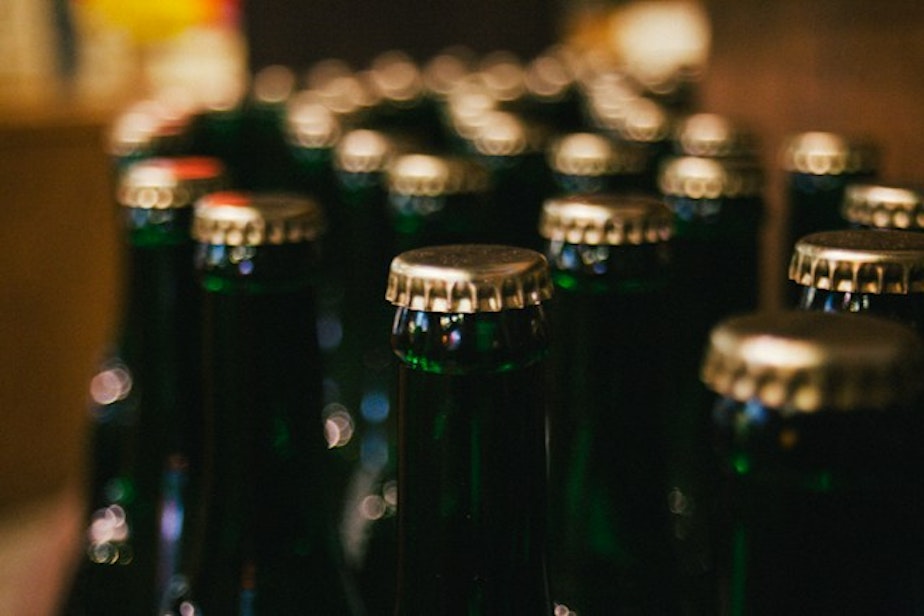 Beer and/or soda bottles.
Beer and/or soda bottles.State lawmakers in Olympia are once again considering a proposal to establish a bottle deposit program for Washington state.
The basic idea: Pay 10 cents per can/bottle, and return the container to get the money back. In a video promoting the proposal, State Rep. Monica Stonier explained that there is a need to increase recycling rates in Washington state.
RELATED: Where does it all go? The journey of San Juan recycling
“I was really surprised to learn about how all of the things I’ve been telling my children about the recycling process — how important it is to sort and take our stuff down to the curb — how unclean that process is and how we are not really recycling to the highest degree that we think we are in this state. The bottle bill really refines that for beverage containers," Stonier said.
“I want to make sure that what we’re telling our kids about recycling is really the truth, and that is what I think the bill does."
The effort is happening via HB 2144, which is currently going through the committee process.
The main idea is that a 10 cent deposit would be added to the price of every beverage can or bottle in the state. Customers can return those containers to a store (most likely an automated kiosk at a store) to get a voucher for the deposit money.
According to Washington's House Democratic Caucus: “Consumers will be able to return bottles at larger retail locations (determined by store size and sales volume). Those stores will have a bottle return kiosk so it won’t be the store’s staff that actually handle the returns. The kiosk will spit out a voucher that can be redeemed for cash in the checkout line.”
Distributors will be tasked with crafting a system to make it all to work. They'll charge stores 10 cents per container. The stores will pass that fee on to customers. Customers will return the containers to get the money back, and the system will then operate in reverse. The goal is to have the deposit money balance out.
The Washington Food Industry Association opposes the bills. It has placed opposition to the bottle deposit proposal on its list of 2024 legislative priorities. According to a statement on its website:
"WFIA does not support deposit return systems for beverage containers, instead we encourage the Washington State Legislature to look at Washington’s existing structure for funding, waste reduction, recycling and consumer education for creative solutions that will make a difference in reducing plastic waste in our waste streams."
Continue reading » -
Lynnwood pays $550K fine for running afoul of standards for sewage burning
Government
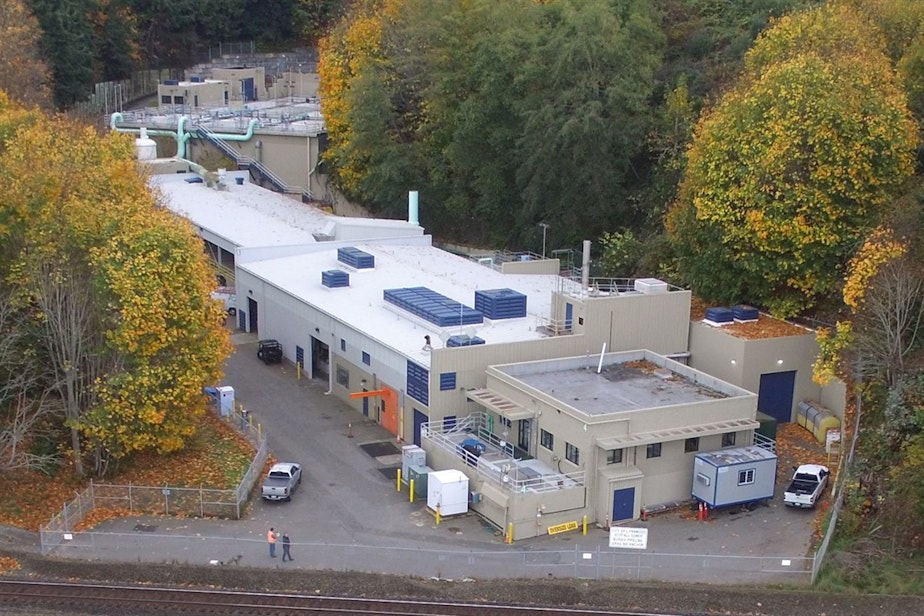 An aerial view of the City of Lynnwood's wastewater treatment plant.City of Lynnwood
An aerial view of the City of Lynnwood's wastewater treatment plant.City of LynnwoodProcessing sewage — it’s a dirty job for any city.
One way governments choose to process that waste is through incineration, however, the process of burning waste has to adhere to strict standards, including the Environmental Protection Agency’s Clean Air Act.
An aging incinerator the city of Lynnwood uses to process waste has become less efficient. At the beginning of 2020, it fell out of compliance with those standards. Now the city has paid more than $550,000 in penalties to the EPA. The city will have to decommission the incinerator to comply with the standards.
The EPA will receive progress reports from the city as it works toward that goal. The agency looks forward to receiving the first of those progress reports later this month, said Bill Dunbar, spokesperson for the EPA Region 10 office in Seattle.
Northwest Public Broadcasting's Lauren Gallup has the full story here.
Continue reading » -
Seattle will start enforcing its anti-graffiti law again
Law & Courts

The Seattle City Attorney’s Office said it will resume enforcement of the city’s anti-graffiti ordinance, in the wake of a favorable ruling by a federal appeals court.
The city has been barred from enforcing the ordinance making illegal graffiti a gross misdemeanor for the past seven months.
RELATED: Seattle wants to put its money where its graffiti is
Last June, U.S. District judge Marsha Pechman ruled in favor of four people who challenged Seattle’s property destruction ordinance as unconstitutional. They had been arrested for writing anti-police slogans in chalk and charcoal on public property.
Pechman prohibited enforcement of the ordinance’s graffiti-related provision, saying it was overly vague and broad and raised free speech concerns. But now a three-judge panel with the U.S. Court of Appeals for the Ninth Circuit has struck down that injunction.
The appeals court ruling concluded that Pechman “speculated about possible vagueness in hypothetical and fanciful situations” and that her concerns did not outweigh the many legitimate applications of the anti-graffiti law.
The ruling stated, ”By failing to inquire into the ordinance’s numerous lawful applications, the district court was unable to analyze whether the number of unconstitutional applications was substantially disproportionate to the statute’s lawful sweep.”
RELATED: Art vs art — $1 million worth of murals coming to Seattle walls
Braden Pence, an attorney for the plaintiffs, said in a statement that their lawsuit will continue.
“Our fight for the right to criticize the Seattle Police Department in children’s sidewalk chalk written on public property without fear of arrest and booking into jail is not over,” Pence said. “The Ninth Circuit left open paths whereby Judge Pechman can still find the anti-writing ordinance unconstitutional, and we look forward to continuing to pursuing these claims in court.”
Continue reading » -
Seattle just had the warmest week in January on record
Environment
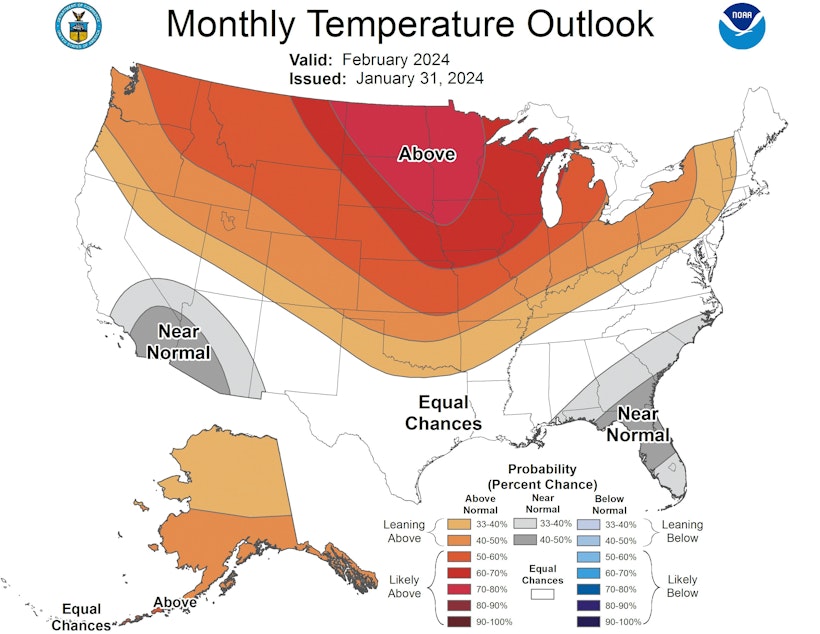 The National Weather Service Climate Prediction Center expects spring-like conditions for February 2024. This graphic from NOAA shows similar conditions across much of the northern United States.NOAA
The National Weather Service Climate Prediction Center expects spring-like conditions for February 2024. This graphic from NOAA shows similar conditions across much of the northern United States.NOAASeattle's average temperature in the past week was 53.8 degrees. According to the National Weather Service, that was the warmest seven-day period between Jan. 1 and Feb. 1 on record since 1984.
This after Seattle experienced its warmest December on record. Statewide, it was the third warmest December on record, according to the Office of the Washington State Climatologist. Plus, 2023 was the planet’s warmest year on record, according to an analysis by scientists from NOAA’s National Centers for Environmental Information.
“After seeing the 2023 climate analysis, I have to pause and say that the findings are astounding,” said NOAA Chief Scientist Dr. Sarah Kapnick. “Not only was 2023 the warmest year in NOAA’s 174-year climate record — it was the warmest by far. A warming planet means we need to be prepared for the impacts of climate change that are happening here and now, like extreme weather events that become both more frequent and severe.”
"We will continue to see records broken and extreme events grow until emissions go to zero,” Kapnick said.
Seattle may see more winter records broken this year. The NWS Climate Prediction Center is forecasting spring-like conditions over the next month.
Part of what is driving above-average temperatures is the fact that we're in the middle of an El Niño winter. El Niño conditions are typically warmer and drier in Washington.
Deputy state climatologist Karin Bumbaco explained the conditions Washington saw in January during a meeting of the Water Supply Availability Committee. Those conditions included both severe cold and the unprecedented warm spell just this week.
Bumbaco attributed the severe, and deadly, cold snap in mid-January to a rare "one-two punch" of conditions at the time. To summarize her very technical explanation, the cold snap resulted from a temporary weakening of El Niño conditions and changes in the polar vortex. In other words, the event was not typical of an El Niño.
And here's an interesting side note: The cold snap was more extreme than our recent warm spell in terms of variance from the normal. Temperatures during the cold snap fell up to 24 degrees below normal, according to the National Weather Service. Temperatures were up to 13 degrees above normal during the warm spell.
Continue reading » -
Friends, family, and legacy. 'The Book of Will' teaches Seattle the meaning of life
Arts & Life
 Reginald André Jackson and Eric Jensen in The Book of Will at Taproot Theatre.John Ulman
Reginald André Jackson and Eric Jensen in The Book of Will at Taproot Theatre.John UlmanIn the wake of William Shakespeare’s death, two actors embark on an improbable journey to publish his complete works and ensure the playwright’s legacy lives on. Laughter ensues.
“The Book of Will” is a witty, historical-drama showing at Seattle’s Taproot Theater. It kicks off the Greenwood playhouse’s 48th season, while also introducing audiences to themes of friends, family, and friends becoming family. These themes will persist through all of Taproot’s shows this season.
With a well-paced first act, lively characters, and a bevy of Shakespeare references flying past you so fast, it’s hard to count them all, award-winning playwright Laura Gunderson presents a story that unfolds beautifully. I’ve read a ton of Shakespeare, and even I was unable to catch every reference. But the delivery, the pacing, and the energy of the performance keeps the audience engaged. My favorite moment occurs in the opening scene of act two, when the comedy is non-existent and we have two grieving characters bearing their souls in a discussion of life, death, God, and the importance of the arts.
My recommendation
“The Book of Will” is definitely worth seeing. If you are into the stage, this is a good show to ease into the new theater season. I’m sure there will be plenty of heavy stuff coming in the months ahead, so an engaging, heartfelt comedy is a nice treat to get folks back into theaters this year.
What to expect (spoilers)
This production is really fun. Even if you are not the biggest Shakespeare fan, there is plenty to connect with. Friendship, love, legacy, and honor are universal themes that are relatable to everyone. If you are Shakespeare fan, however, then you are in for a treat because this production is an ode to the legendary bard.
The play opens with seasoned actors, Henry Condell (Reginald Andre Jackson), John Heminges (Eric Jensen), and Richard Burbage (Nolan Palmer), sitting in the Globe Pub discussing a horrible rendition of “Hamlet.” The three friends are former actors in Shakespeare’s company and are livid that people are producing productions with Shakespeare's name that didn’t properly represent his work.
After a scene where the trio confront the young actor who played Hamlet so terribly, Palmer delivers a wonderful monologue to demonstrate how to properly embody a Shakespeare character. The audience vocally expressed appreciation for Palmer's artistic diatribe, but in the very next scene, we learn his character, Richard Burbage, has died. This spurs the last two remaining actors from Shakespeare's company, who are now the last two actors with true knowledge of Shakespeare's plays, to begin the seemingly impossible journey to collect and publish the complete works of William Shakespeare.
The first act was certainly enjoyable. The back-and-forth nature of the dialogue — the scenes taking place in the pub with chummy pals bantering over ale — was gripping, but there was something missing. There was a depth that was never quite reached. Great comedy needs to be paired with drama in the same way that sweet needs to be balanced with salt. The contrasting nature of pleasure and pain is what makes each sensation so impactful. The opening act of this production had all the highs, but the lows weren’t enough to create the necessary appreciation for the highpoints.
Continue reading » -
Kirkland students' bill to put Narcan in schools passes the Senate, heads to House
Government
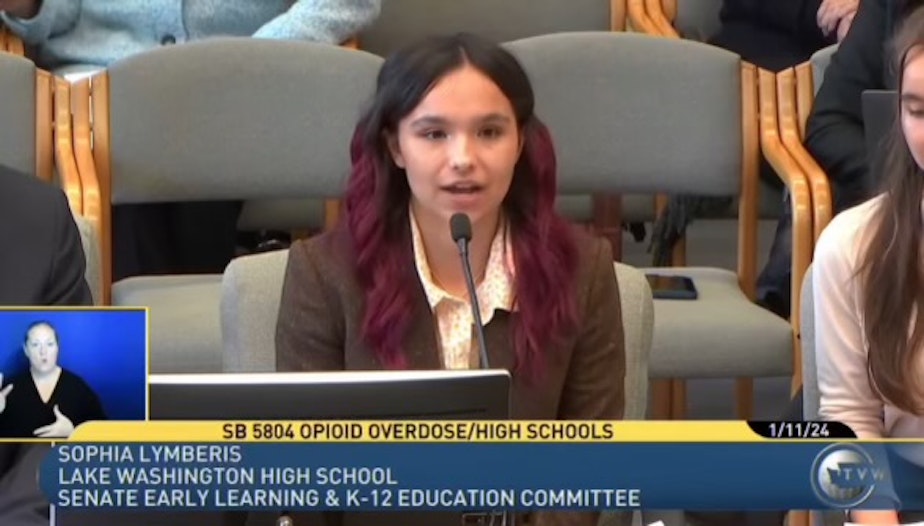 Lake Washington High School senior Sophia Lymberis testifies on behalf on a bill to put Narcan in all Washington K-12 public schools, charter schools, and state-tribal education compact schools.Courtesy of the office of Sen. Patty Kuderer
Lake Washington High School senior Sophia Lymberis testifies on behalf on a bill to put Narcan in all Washington K-12 public schools, charter schools, and state-tribal education compact schools.Courtesy of the office of Sen. Patty KudererA bill to put opioid reversal medication in every Washington public school passed out of the state Senate and is now headed to the House.
Senate Bill 5804 would require all K-12 public schools, charter schools, and state-tribal education compact schools to keep the opioid overdose reversal medication naloxone on hand.
Naloxone, also known by its brand name Narcan, is a nasal spray that reverses the effects of deadly opioids. It's most often used to counteract the effects of fentanyl, a drug that is up to 50 times more potent than heroin and that has driven the opioid crisis across the country, including in schools.
The bill, which was first reported on by Crosscut, won unanimous approval in the Senate Thursday.
That's good news for students whose communities have been affected by the opioid epidemic, but it's especially welcome news for the students who actually proposed the bill to lawmakers.
"It's been something that we, as students, have to be hyper-aware about and vigilant about," said Sophia Lymberis, one of the Lake Washington High School seniors who came up with the idea for an AP Government class.
"We also wanted to create legislation that would impact people our age, because oftentimes our voices aren't the ones being heard and represented within the Washington state legislature."
Lymberis and her groupmates discovered gaps in existing state legislation, which currently requires only high schools in districts with 2,000 or more students to carry Narcan.
Continue reading » -
How's business in Downtown Seattle? Depends on who you ask
Business
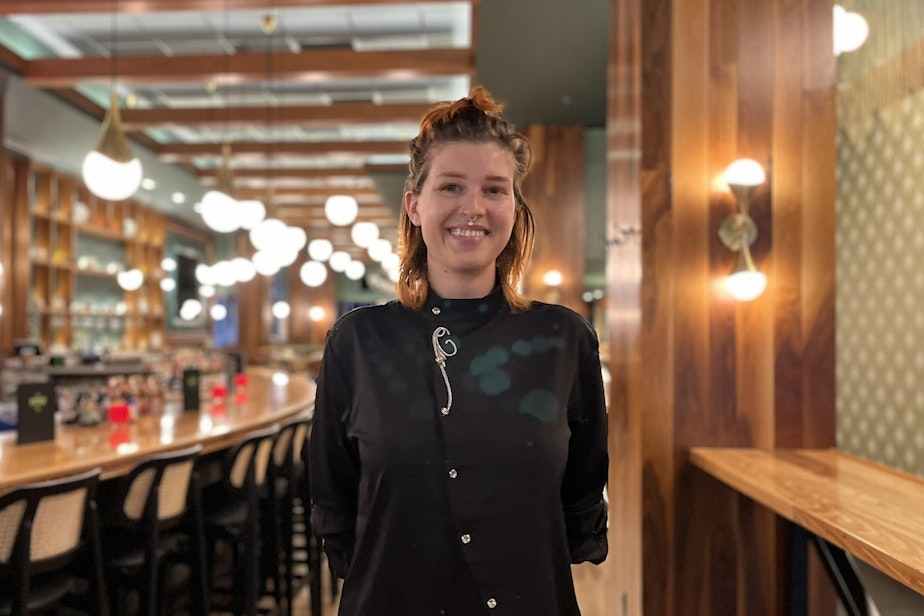 Mikayla Wingerter is shift manager at Mint, an avant garde Indian restaurant on First Avenue in Downtown Seattle.KUOW Photo/Joshua McNichols
Mikayla Wingerter is shift manager at Mint, an avant garde Indian restaurant on First Avenue in Downtown Seattle.KUOW Photo/Joshua McNicholsBusinesses in Downtown Seattle report mixed results seven months into Mayor Bruce Harrell's plan to revitalize the neighborhood.
Mikayla Wingerter is shift manager at Mint, an avant garde Indian restaurant on First Avenue.
She says January was really hard.
"We would have days where we didn't have our first person come in until like four hours into the restaurant being open," Wingerter said, "which is a shame because the food here is amazing."
People tend to flood into the restaurant when Benaroya Hall hosts an event. After that, it's back to the doldrums again.
But down at the glasses store, "Eyes on You," manager Chantel Anderson says things are picking up.
She says more people are stopping by on their way home from work. That could signal that the negative impact of remote work on downtown may be diminishing over time.
One day she said there were so many customers that "the owner and I looked at each other [and said,] 'There's a lot more walk- ins, even than, I would say, pre-pandemic.'"
Cell phone data by Placer.ai shows that foot traffic is strong near Pike Place Market and the waterfront, but sluggish across other parts of downtown. Tourists are back, but only some of the office workers are.
Continue reading » -
Surge of new EV charging stations coming to Washington state
Environment

Washing's goal of getting more electric vehicles on the road got a surge of support Thursday with the announcement of 560 new charging sites across the state. The sites add up to the installation of nearly 5,000 charging stations.
"We are making such huge progress building a clean transportation system in the state of Washington, one that gets people clean, reliable, reasonably priced transportation and fights climate change, and we are rocking it," Washington Gov. Jay Inslee said at an announcement event Thursday, hyping the crowd for the new electric vehicle (EV) charging stations coming to Washington.
RELATED: Road trip! Kicking the tires on electric travel in the Northwest
Inslee said that Washington had a goal of getting 50,000 EVs on the road by 2020, and that the state currently has about 125,000 EVs. All those electric cars will need places to plug in.
The February 2024 announcement comes a year after Washington's first carbon auction. The new EV charging stations are the latest round of projects for Washington's Electric Vehicle Charging Program. They're funded by $84 million from the Climate Commitment Act's carbon auctions. (Read more about the Climate Commitment Act below.)
Breaking down the EV stations:
- The charging stations will be installed at 560 sites across the state
- 4,710 will be Level 2 chargers (with 5,362 plugs between them)
- 271 direct current, fast chargers (with 420 plugs between them)
Stations will be located at:
- 213 multifamily sites
- 211 workplaces, government agencies, and school districts
- 141 public locations (libraries, grocery stores, community centers)
The Department of Commerce says that the chargers could add 10-20 miles per hour of charging; they can fully charge a 300-mile battery in 6-8 hours. The fast chargers can fill a 300-mile battery up to 80% in 20 minutes. Funding for the projects is going to electric utilities, nonprofits, public agencies, and tribes.
Continue reading » -
Republicans, Democrats, carbon, and you: Debating Washington's cap and trade
Politics
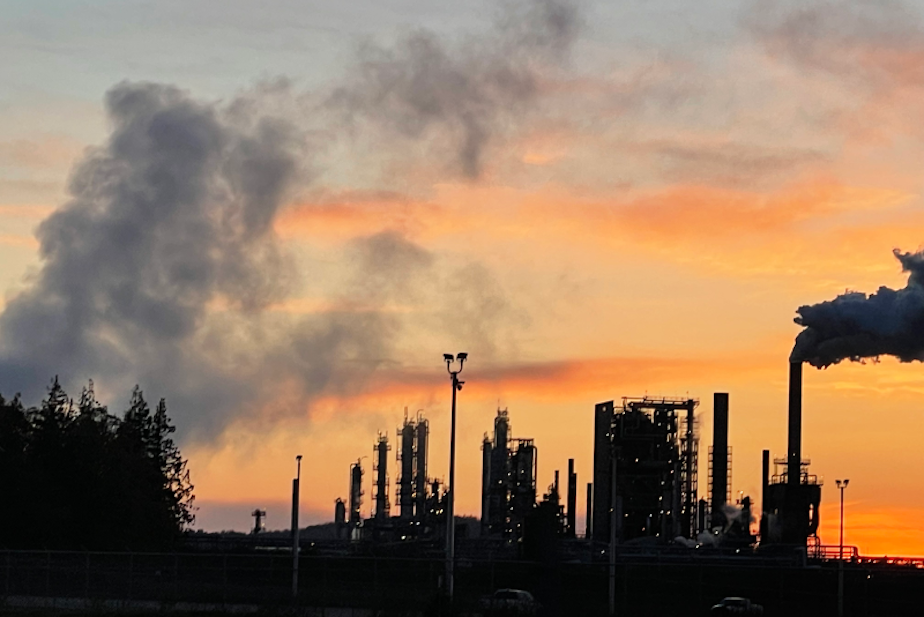 The sun sets behind the Marathon Petroleum refinery in Anacortes in April 2022.Courtesy of Kathleen Lumiere
The sun sets behind the Marathon Petroleum refinery in Anacortes in April 2022.Courtesy of Kathleen LumiereEven before Washington implemented a cap-and-trade program, which put the ability to pollute carbon into the air up for auction, its effects on the state were hotly debated. Would it cause fuel and other prices to spike? Would it generate enough money to fund climate change initiatives? Even now, after a year of the carbon auction, the debate remains.
“There was a lot more demand for those emissions than some folks anticipated, meaning it is harder to reduce carbon emissions than people thought," said Yoram Bauman, aka The Standup Economist, while chatting with KUOW's Soundside.
“You don’t get to taste the honey without the sting of the bee,” he said, noting that to make progress on environmental and climate goals, it's gonna be a struggle.
In short, Republicans currently want to nix the entire cap-and-trade program through the Legislature or through the initiative process; Democrats want to tweak the law, and even link up with the carbon markets in California and Quebec in an effort to make the system cheaper.
RELATED: The 6 voter initiatives likely heading to Washington ballots this fall, explained
Washington's voters are likely going to answer this debate themselves as Initiative 2117 is slated for the November ballot. The initiative aims to cancel the state's carbon auction. As this debate is likely to continue through the 2024 election season, KUOW's Soundside spoke with a state Democrat, Republican, and an economist to get to the root arguments around Washington's carbon auction — arguments voters should consider when filling out their ballots.
Did Washington's carbon auction cause fuel prices to surge?
Gas prices in Washington state dramatically rose as the carbon auction went into effect. The state had the highest gas prices in the nation last summer. Democrats say that Washington gas prices have been among the most expensive in the USA for decades, and that while the carbon auction may have contributed to prices, it's just one factor out of many. Democrats point a finger of blame at oil companies and refineries, that seek higher profits, as the main reason prices went up.
“I’m not going to duck the fact that climate policies would have an impact on fuel prices; how much is up to debate," State Sen. Joe Nguyen (D) told Soundside, adding that gas prices have recently been lower than they were before the carbon auction began.
RELATED: The price of pollution in Washington state hits $2 billion
Continue reading » -
'Welcome to Mike Macdonald Day': Meet the Seahawks' new head coach
Sports
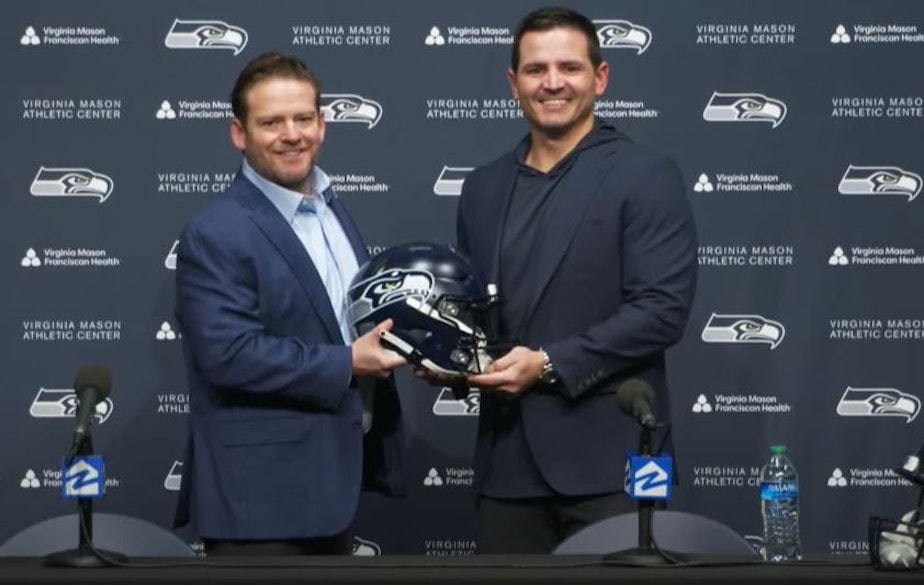 Seattle Seahawks general manager John Schneider poses with the team's new head coach, Mike Macdonald, on Feb. 1, 2024.seahawks.com
Seattle Seahawks general manager John Schneider poses with the team's new head coach, Mike Macdonald, on Feb. 1, 2024.seahawks.comThe Seattle Seahawks have found their man to replace longtime head coach Pete Carroll.
Mike Macdonald comes to Seattle football from the Baltimore Ravens, where he was the defensive coordinator from 2022 to 2023 and was on the coaching staff from 2014 to 2020. He left for a brief time to join the coaching staff at the University of Michigan before returning to the Ravens for his final season in Baltimore.
With this latest move, the 36-year-old Macdonald is now the youngest active head coach in the National Football League. Pete Carroll, at 72, was the oldest active head coach before losing his job last month.
"Welcome to Mike Macdonald Day," Seahawks General Manager John Schneider said, as he opened a press conference Thursday to introduce the coach — "a special dude" as Schneider called him — with much ado about how this was a chance to move the team forward.
"This is a humbling feeling," Macdonald said. "It feels like we're in this thing together."
The Ravens finished with the NFL’s best record this season before losing in the AFC Championship to the Kansas City Chiefs.
For those of you who are more stat-inclined, the Seahawks broke down some of the key numbers in a press release:
- The Ravens led the NFL in scoring defense, allowing 16.5 points per game.
- They also led sacks, with 60 for the season.
- And the Ravens finished the 2023 season tied for first in takeaways, with 31.
- Plus, they ranked sixth in yards allowed, at just about 301 per game.
The Ravens' standing reportedly helped make Macdonald one of the most coveted potential hires this offseason. He reportedly interviewed with six teams, including Seattle.
"It is a leap of faith," Macdonald said. "But this is a special city. This is a great football city, and we got the best fans in the world. ... This feels like home already."
Continue reading » -
The 6 voter initiatives likely heading to Washington ballots this fall, explained
Government
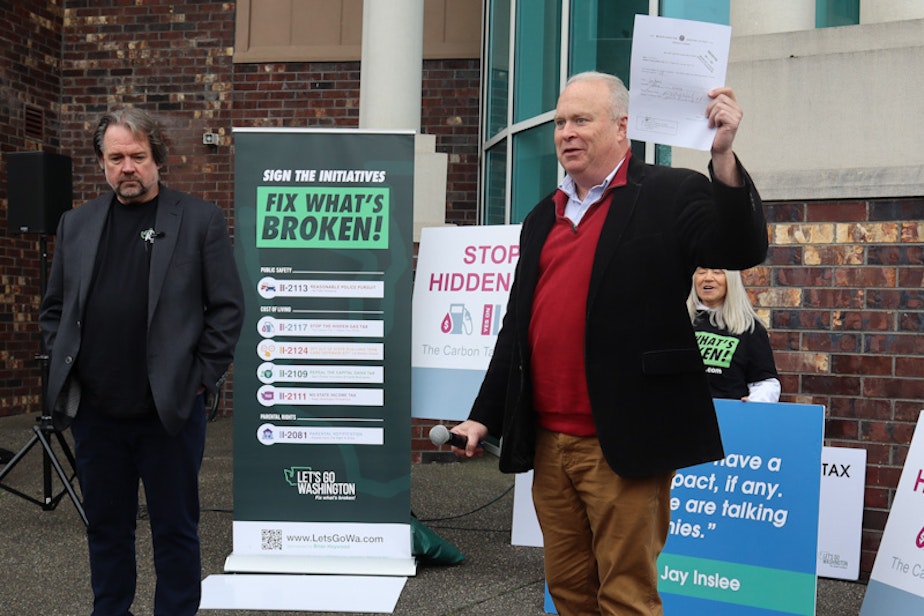 Two key figures behind the initiative effort, financial backer Brian Heywood (left) and Washington State Republican Party chair Rep. Jim Walsh (R-Aberdeen), helped drop off petitions at the Secretary of State's office in Tumwater last fall in order to qualify the initiatives for ballot consideration in 2024.NW News Network
Two key figures behind the initiative effort, financial backer Brian Heywood (left) and Washington State Republican Party chair Rep. Jim Walsh (R-Aberdeen), helped drop off petitions at the Secretary of State's office in Tumwater last fall in order to qualify the initiatives for ballot consideration in 2024.NW News NetworkSix Republican-backed policy initiatives have qualified for consideration in the Washington Legislature and will likely appear on voters' ballots this November.
The measures represent a major challenge to laws passed by the Legislature's Democratic majority in recent years.
This is also the largest group of initiatives in front of state lawmakers at the same time in a single year.
Here's what you need to know about these proposals.
Initiative 2117
Probably the most consequential of the group, Initiative 2117 would eliminate the central part of the state's landmark Climate Commitment Act: the cap-and-trade program, which sets limits on how much big companies can pollute and requires them to buy "emissions allowances." The idea is that the number of allowances will go down over time, with the goal being a carbon-neutral Washington by 2050.
The carbon auctions started just last year, but critics of the program blame it for high gas prices and call it a "hidden gas tax." People who are supposed to be protected from any rising fuel costs tied to the program, like farmers and truckers, have complained that the state hasn't created an adequate system to facilitate those exemptions.
Some tribal leaders have also expressed frustration with the policy, saying it violates tribal sovereignty, as oil companies pass along higher costs to distributors and customers.
Meanwhile, supporters of the Climate Commitment Act point out that Washington's average cost of a gallon of gas has been among the highest in the country for years. There is data that shows the cap-and-trade program has had an impact on gas prices, but the exact number varies depending on who you ask. It’s unclear exactly how much repealing the program would affect prices at the pump.
Democrats and others who want to keep the law intact also point to the funding it provides for projects aimed at making communities across the state more adaptable to the already-changing climate and helping them transition away from fossil fuels.
Continue reading » -
Potentially deadly fungus found at Seattle hospital. What to know before you panic
Health
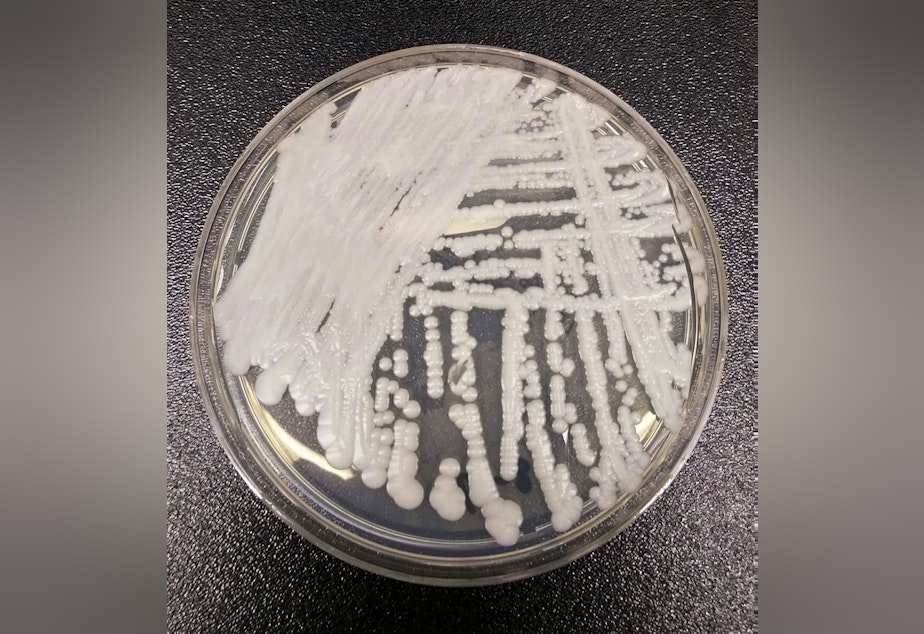 This undated photo made available by the Centers for Disease Control and Prevention shows a strain of Candida auris cultured in a petri dish at a CDC laboratory.Shawn Lockhart/Centers for Disease Control and Prevention via AP, File
This undated photo made available by the Centers for Disease Control and Prevention shows a strain of Candida auris cultured in a petri dish at a CDC laboratory.Shawn Lockhart/Centers for Disease Control and Prevention via AP, FileFour people with links to Kindred Hospital Seattle have now tested positive for a potentially deadly, drug-resistant fungus.
But you should read on before you panic about a widespread outbreak à la “The Last of Us.”
“The outbreak is not a big concern for the general public,” said Meagan Kay, the deputy chief of Public Health – Seattle & King County’s Communicable Disease Epidemiology and Immunization Section.
So, what did they find exactly, and why is it noteworthy?
The fungus is called Candida auris, a type of yeast known to spread easily among patients in health care facilities.
Another case of C. auris was discovered in July in a patient from Pierce County who was admitted to Kindred Hospital. This current outbreak includes four cases. Three were screened and identified at Kindred. A fourth patient who was screened at a facility in Snohomish had previously received care at Kindred.
RELATED: Washington's first case of potentially deadly fungus found in Pierce County
People who are infected don’t always show symptoms, and, according to the Centers for Disease Control and Prevention, there isn’t even a common set of symptoms specific to C. auris infections. Symptoms depend on the location and severity of the infection, which can be in different parts of the body, including open wounds, ears, and the bloodstream, where it can be dangerous, according to the CDC.
It’s so elusive, that this is the first known locally acquired case of the fungus in Washington state.
Continue reading »
